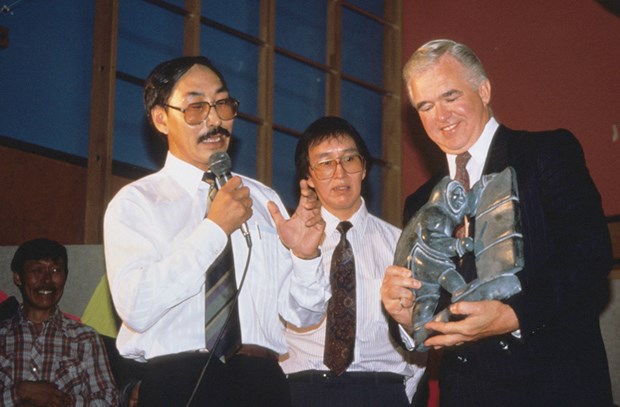It’s easily missed on the Steveston Village boardwalk — a small plaque honouring a man who helped build harbours, calm gun-wielding protesters and change the map of Canada.
Tom Siddon served Richmond as its member of parliament for 15 years — from 1978 to 1993 — and was the first local MP to be appointed to cabinet. His senior government roles put him in the middle of the Oka Crisis, fishing battles and an expensive decision to replace the military’s Sea King helicopters.
Now 73, Siddon still keeps his eye on Ottawa, only now from his perch in the Okanagan, where he’s an elected official with the regional district.
“I can’t predict, but as it stands I don’t think (Stephen) Harper has enough public support, given all that’s happened, to win a majority. If he wins a minority I don’t think he’ll find any allies anywhere,” he said in an interview with the Richmond Newswhile at the Union of B.C. Municipalities convention in Vancouver last week.
First elected to Richmond council in 1975, the former University of B.C. engineering professor made the leap to federal politics after Progressive Conservative MP John Reynolds resigned in 1977.
Running in Burnaby-Richmond-Delta, Siddon won the 1978 by-election — one of three votes he’d face in as many years.
At the polls again in 1979, voters re-elected Siddon — now in a riding called Richmond-South Delta — and a minority Progressive Conservative government led by Joe Clark. Siddon was named parliamentary secretary to the minister of Fisheries and Oceans. But the government was short-lived —defeated on a budget vote.
“It was December, just before Christmas, that we were defeated,” remembered Siddon. “We had to pack up our kids, take them out of school, because by then we had moved them to Ottawa. We came back to Richmond, rented a house, and they went to school in Richmond while I did a campaign.”
He won re-election in 1980, but his party was defeated by the Liberals and Pierre Trudeau. Siddon served as a critic on various files and aligned himself with Brian Mulroney.
In the 1984 election, Siddon won again, this time with a Conservative majority government led by Mulroney. Siddon and his party would go on to win again in 1988.
The Richmond MP’s first cabinet post came in 1984 when he was named minister of state for Science and Technology. It was the beginning of nine years in cabinet and the endless flights, meetings and lack of sleep that went with it.
“From time to time it was quite taxing...but I loved it. I thrived on it,” he said. “Being in cabinet, having significant ministries, dealing with major and sometimes historic decisions, was very rewarding.”
In 1985 Siddon was promoted to Minister of Fisheries and Oceans, a portfolio he would have for five years. He had his critics, but Siddon said he’s proud of the role he played as minister in the development of Steveston, a fishing village where public access to the water and boats was once restricted.
In 1990, Mulroney moved Siddon from the frying pan into the fire, appointing him minister of Indian Affairs and Northern Development. That summer Siddon found himself behind barbed wire at Oka, Que., where a violent land dispute pitted Mohawk protesters against Canadian soldiers. There, he signed an agreement for disengagement, which 25 years ago led to the end of the crisis.
As Indian Affairs minister Siddon also signed a historic agreement to create the new territory of Nunavut, and helped establish the B.C. treaty process.
In 1993 Siddon served briefly as Minister of National Defence, a role in which he was responsible for ordering a new fleet of navy helicopters to replace the aging Sea Kings. The Liberals would later rip up that deal.
His career in federal politics ended Oct. 25, 1993, when the Progressive Conservatives were wiped out in an election that saw significant gains for the upstart Reform party. The Liberals won, as did their man in Richmond, Raymond Chan.
Siddon still has high praise for Mulroney, calling him an outstanding prime minister with a great vision for Canada.
“He always said, ‘If you’re doing the right thing minister Siddon, you won’t be hearing from me.’ We never had any directive to vote this way or that way. We supported one another.”
As Canada’s 42nd election nears, on Oct. 19, Siddon urges voters to consider candidates, not just parties.
“Parties will do surprising things and change their minds. But the individuals you elect are the people who can be called to account,” he said. “Don’t throw your vote away on a party...at the expense of helping elect somebody who can really do the work for you — as I was able to do, I think, not only for my constituents in Richmond but for the people of Canada.”


.jpg;w=120;h=80;mode=crop)
